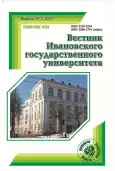THE FEBRUARY REVOLUTION AND LUSTRATION: SKETCHES TO THE PROBLEM (based on the materials of the democratic press of Ivanovo-Voznesensk)
- Авторлар: Ilyin Y.A.1
-
Мекемелер:
- Ivanovo State University
- Шығарылым: № 1 (2025)
- Беттер: 89-102
- Бөлім: History
- URL: https://journal-vniispk.ru/2219-5254/article/view/310938
- DOI: https://doi.org/10.46726/H.2025.1.
- ID: 310938
Дәйексөз келтіру
Толық мәтін
Аннотация
The subject of the study is unusual: its uniqueness lies in the novelty of its approach to considering, in particular, such aspects as the restructuring of political self-government bodies. That transformation included their security and law enforcement agencies, the exposure and arrest of secret employees of the tsarist secret police,
the social portrait of the informant-provocateur of the provincial factory center of Russia. The phenomenon of the justice system of the February Revolution is exemplified by the Interparty Conscience Court established by the democratic forces of the city, which considered and sentenced secret agents of the tsarist secret police. The Court based its decisions on the principles of humanism and justice. The material presented in the article on lustration in Ivanovo-Voznesensk leads to the understanding that moderate socialist and democratic forces played a leading role in the defeat of the local gendarme administration against the background of high public activity of the population. Their valuable experience of cooperation in the destruction of the repressive apparatus of tsarism made it possible to develop the most acceptable form a coalition of constructive forces in the implementation of the principles of democracy in the Russian statehood. The mouthpiece of these sentiments and concrete steps towards the democratization of the regime of power was the democratic press of Ivanovo-Voznesensk. It was from its pages that ideas about humanism and justice, appeals and proposals about the possibility and necessity of uniting the democratic and socialist forces of the country for the construction of a Free and Great Russia were introduced into society
Авторлар туралы
Y. Ilyin
Ivanovo State University
Хат алмасуға жауапты Автор.
Email: ilyin37@mail.ru
Doctor of Sciences (History), Professor of the Department of History of Russia Ivanovo, Russian Federation
Әдебиет тізімі
- Dordzhiev D.E. Lustration: a measure of constitutional and legal prevention, Moscow, 2020, 89 p. — In Russ.
- Krasnov M.A. Introduction to constitutional law with clarification of complex issues, Moscow, 2018, 454 p. — In Russ.)
- Nudnenko L.A. On the issue of lustration in legislation and the practice of its implementation in the Russian Federation, State power and local self-government, 2015, no. 9, pp. 41—44. — In Russ.
- Radbruh G. The philosophy of law, Moscow, 2004, 238 p. — In Russ.
- Czarnota А. Lustration, Decommunisation and the Rule of Law, Hague Journal on the Rule of Law, 2009, vol. 1, pp. 307—336.
- David R. From Prague to Baghdad: Lustration Systems and their Political Effects, Government and Opposition, 2006, vol. 41, no. 3, pp. 347—372.
- David R. Lustration Laws in Action: The Motives and Evaluation of Lustration Policy in Czech Republic and Poland (1989—2001), Law & Social Inquiry, 2006, no. 28 (2), pp. 387—439.
- Research Handbook on Transitional Justice, ed. by Lawther C., Moffett L., Jacobs D., Cheltenham, 2017, 576 p.
- Rožič P., Nisnevich Y. Lustration Matters: А Radical Approach to the Problem of Corruption, Studes in Comparative International Development?, 2015, vol. 51, no. 3, pp. 257—285.
- Sadurski W. Rights before Courts. A Study of Constitutional Courts in Postcommunist States of Central and Eastern Europe, Berlin: Springer, 2005, 377 p.
- Williams K., Fowler B., Szczerbiak A. Explaining lustration in Central Europe: a “post-communist politics” approach, Democratization, 2005, vol. 12, no. 1, pp. 22—43.
- Zabyelina Yu. Lustration Beyond Decommunization: Responding to the Crimes of the Powerful in Post-Euromaidan Ukraine, State Crime Journal, 2017, vol. 6, no. 1, pp. 55—79.
Қосымша файлдар









